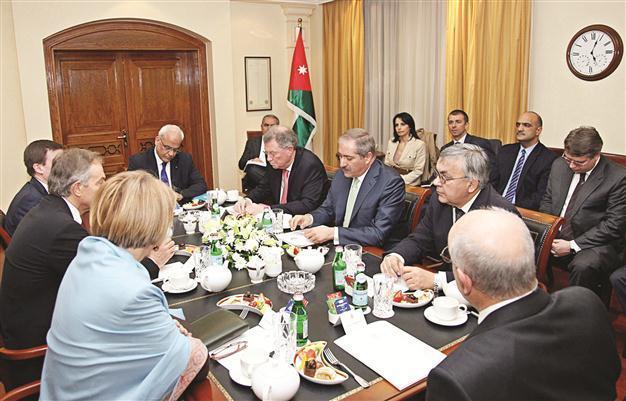Israel-Palestine peace talks on verge of collapse
AMMAN

Quartet of Middle East peace mediators including Middle East envoy Tony Blair (2nd L), senior US envoy to the peace process in the Middle East David Hill (L, obscured) and Palestinian chief negotiator Saeb Erekat (4th L) attend a meeting with envoys, Palestinian and Israeli negotiators in Amman on Jan 3. REUTERS photo
The first meeting between Israeli and Palestinian peace negotiators in more than a year has ended without any significant breakthrough, but in a small sign of progress, the sides agreed to meet again tomorrow, officials said.Jordan Foreign Minister Nasser Judeh, who hosted Jan. 3’s gathering in the Jordanian capital Amman, expressed some hope. “The important thing is the two sides have met face to face today,” he said. While acknowledging there were no breakthroughs in “substance,” he praised the positive atmosphere and said both sides had agreed to hold further talks, although some will be conducted secretly, Associated Press reported. “We agreed the meetings will continue and will take place here in Jordan.”
A Palestinian official close to the talks told Agence France-Presse “the meeting on Tuesday... brought nothing new because the Israeli delegation did not deliver any new elements during the discussions,” he said. “[But] we agreed to have a second meeting on Friday in Amman under the auspices of the Quartet and in the presence of Jordan,” he said on condition of anonymity.
During the meeting, Israeli Prime Minister Benjamin Netanyahu’s envoy Yitzhak Molcho held several sessions with his Palestinian counterpart Saeb Erekat. The pair met with international diplomats and held a separate working meeting of their own. Judeh said the Palestinians presented their proposals for future border and security arrangements and Molcho promised to submit an Israeli response soon. The Israeli and Palestinian teams declined comment, referring reporters to Judeh’s statements.
Praise from US, EU and UN
The announcement drew praise. At the United Nations, Secretary-General Ban Ki-moon encouraged the parties “to build on this meeting and to continue working to establish forward momentum toward a lasting peace.” In Washington, a White House spokesman welcomed the “positive development.” European Union Foreign Policy Chief Catherine Ashton urged Israel and the Palestinians to press ahead with peace efforts on the heels of their “promising” talks.
Meanwhile, Fatah central committee member Nabil Shaath met with Hamas leader Mahmoud Zahhar in Gaza City the afternoon of Jan. 3 to progress the reconciliation deal between their parties. Hamas and Fatah signed a reconciliation deal May 2010 after years of bitter rivalry, but its implementation has since stalled.
In a press statement, Shaath said they discussed the political detentions in Gaza and the West Bank and ways to implement the agreement, despite all the obstacles facing the reconciliation, Maan news agency reported. In Gaza, Hamas leader Ismail al-Ashqar called the talks “a very big disappointment.” “If these negotiations continue, this will totally blow up the Palestinian reconciliation,” he said. Hamas spokesman Izzat al-Rishq also said the talks only served to “sell illusions to the Palestinian people” and benefit Israel and the Middle East Quartet, “which is trying to repair its image.”
Imprisoned Fatah strongman Marwan Barghouti said the Palestinian Authority should cease peace negotiations with Israel and concentrate on the popular struggle and efforts to achieve membership within the U.N. It was useless to breathe life into a “dead body,” he said, Israeli daily Haaretz reported.
















